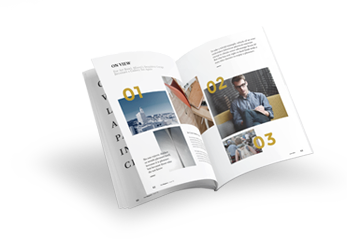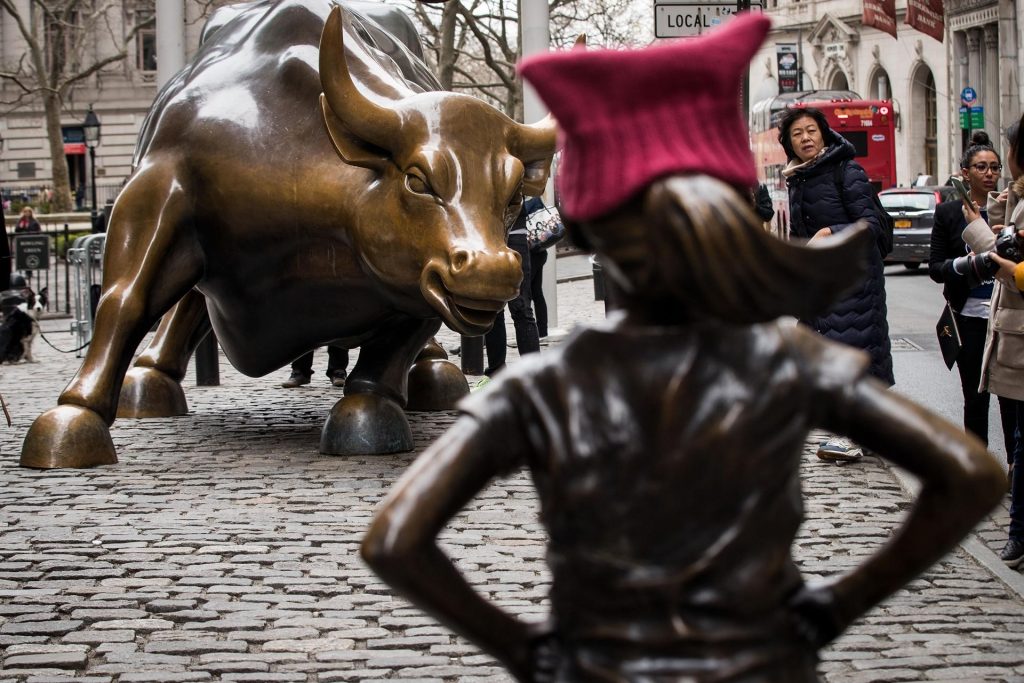
January the 20th was a big day this year. The American Inauguration took place and within 24 hours the new president was formally positioned as the leader of the ‘free’ world. Despite this fact, women were seen gathering and coming together from around the world. Many asked, ‘why now?’ ‘What does this all mean?’ The Women’s March of 2017 is now recognized as the largest single day demonstration in US history. With 678 marches taking place worldwide and an estimated 4.8 million marchers in total (Yahoo.com, Fortune.com), clearly something is trying to be said. It is important to note that this was not a women’s only march. It was a march of solidarity, a march which included all members of our society. We marched in Cape Town, to show support, not only for our sisters in America – who’s women’s rights are currently under threat with the new presidency -, but for women and minority groups still living under oppression from their governments. It was a powerful rising of the people standing up for humanity, standing up for love.
With our new faithful companion, the book, and our brewing female fire, we began a quest to attempt to understand the history of women’s oppression. Though not a complete surprise, it still shocked us that women have been inferior to the man since the beginning of history as we know it. One could even break down the very word to his-story, a past which seems to have neglected much of her-story. Female oppression began some 6000 or more years ago, prior to many other forms of oppression which we see and fight for today. It was said that the Hunters and Gatherers who divided the sexes and since then it has been a gap that, only after thousands of years, is slowly starting to bridge. When we think of women empowerment naturally our minds take us to that infamous word, feminism, with all its complexities and controversies.
A recently published article, which nicely defines what feminism means to us, can be found in the ‘San Francisco Chronicle,’ written by feminist and ecologist, Elyse DeFranco. The article is titled, “Fearless Girl’ Stands Up to Old Thinking,” and depicts the new statue seen on Wall Street of a young girl, hands on her hips, facing the infamous Wall Street Bull. The bull personifies the ‘reckless hyper-masculine and toxic stop-for-nothing mentality that feeds the financial market,’ which is seen in direct conflict with the young girl. Of course, a statement piece such as this has received worldwide media attention, but what is concerning to us, as young budding feminists, is the confusion around what the installation actually symbolizes.
“The problem,” says DeFranco, “is not the lack of representation of women on Wall Street – But Wall Street itself.” Generally, when one talks about feminism, we assume powerful, dominant women. The issue with these assumptions, particularly that of lean in feminism – where women are made to work extra hard and companies forced to increase their gender parity on boards- is that ‘progression,’ for some of us females, is not through receiving positions in a male dominated corporate world, but rather through actively resisting the ideology behind such a world. The current unregulated capitalistic system, dominated by patriarchal corporations and governments, are taking us down a path of global decline. We are exploiting our people and our natural resources to a point of no return. It is time we took back some of those ancient feminine ideals of a more equitable society. A society which places our people and the protection of Mother Nature above profits.
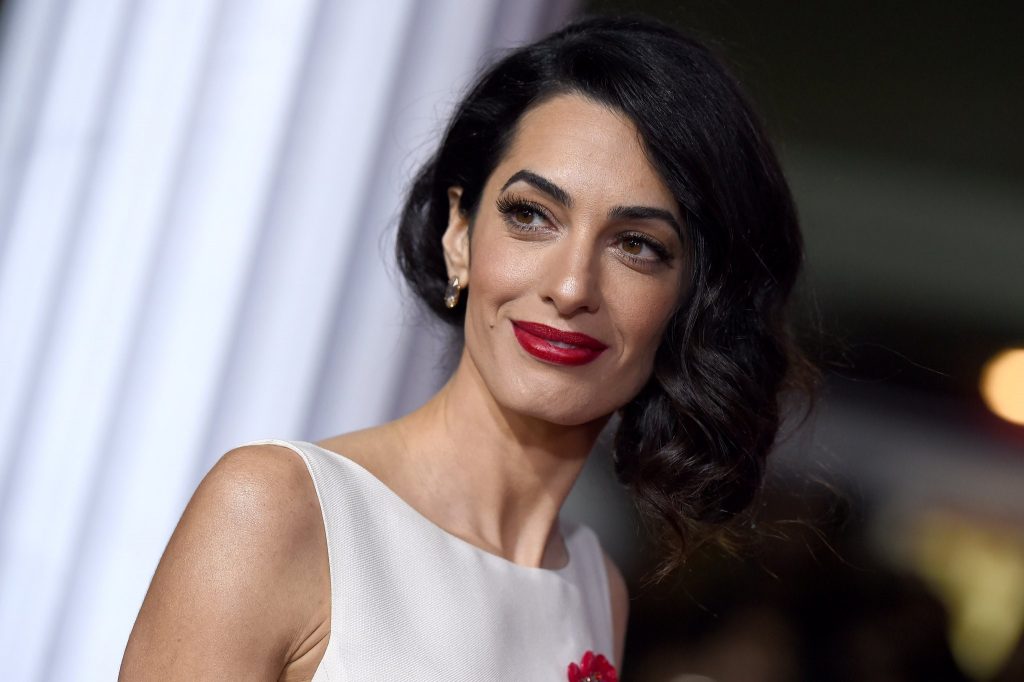
As we look around the world, there are many powerful women leaders who spring to mind, with all different positions on the feminist ideological spectrum. We have the big names who are truly inspiring ambassadors for the uprising of equality: Amal Clooney, Malala Yuosafzi, Annie Leibowitz, Chimamanda Ngozi Adichie and Diane von Furstenberg, to name a few. In this article we will look at two women, perhaps unknown to you, for they are not in the eyes of the global media, but who are two women living in remote places on opposite ends of the Earth, both doing work that is not always acknowledged by the wider public, but which we believe deserves a voice.
“I am not a talker. I am a doer.” – Linzi Thomas
When you meet Linzi you will soon realize that this quote perfectly sums her up. When I first met her, at the age of fifteen, I was amazed when I entered her home in Camps Bay and found street children living with their family. Growing up in a white privileged bubble in Cape Town, this was not something you saw your average white female (particularly a Camps Bay resident) do. Linzi was never afraid to get her hands dirty and truly attempt to change these kids lives, she has genuinely seen and done it all. And now from her very own words. – Annette Muller
“My name is Linzi. I was born in January of 1965 and grew up in rural Natal, where my stepfather was the only dentist and my mother a politician – and the cleverest woman I knew. I used to see queues of Zulu people every weekend of my life, waiting for my father to assist them. He provided this service for free and it used to make my heart sing to see people healed and walk away pain free. We grew up with no colour, everyone was the same to us, my other ‘mother,’ Rita Bengu used to bath, feed and put us to bed every night. She taught me love and resilience. At the time I never had a clue that she had left her children to care for me or that there was this thing called “apartheid.” Life got rough when we left Zululand, my family fell apart, my step father left us and we grew up in poverty. I lived with many different families but still managed to matriculate from Northlands Girls High School. I married young and was gifted with the most precious son, Wesley Thomas, my Guardian Angel and Mentor through this life. I was happily working in the South African Film Industry when I met my first ‘street’ child, from that day onwards, I could not ignore the fact that children were growing up on our streets, right in front of us, and so I went on a crusade to understand their stories.
I went from working in the Namibian desert with Jennifer Lopez, to subservience and the NGO Sector. I started Street Universe in 1988 and had the most incredible mentor, Paddy Upton (SA Cricket), who carried me through 3 of the toughest years of my life – learning the streets of South Africa. Nothing could have prepared me for the daily trauma I lived, seeing the abuse of children, who had been labelled into categories of funding, so we could make sense of what was happening in our society. I remember having a counter in my office and every time someone on the streets died, we would honour them with their names on our counter – so they were never forgotten – when we reached 184 names, I stopped, I was immune to seeing death, something I had no idea I was meant to deal with. I resigned from Street Universe in 2000, ousted from my own organisation. We had become top heavy and were receiving too much attention due to our Laureus World Sporting Event, which saw us in Monte Carlo being awarded for our efforts. Wiseman Dinizulu (former street child) and myself attended the awards and the day we returned, we were no longer revered, we were chastised.
Wiseman, Wesley and myself soon thereafter started The MylifE Foundation – our objective: how do we get someone off the streets and reintegrated back into society. We achieved this in over a decade and had many beautiful success stories. Wiseman Dinizulu is today a top technician in the South African Film Industry; MK Kapa and Mzamo Zimisile became Jamie Oliver trained Chefs; Freda Darvel travelled the world having reached the finals of the Coca Cola Pop stars; Martin Africa became the face of the Homeless World Cup; Sifiso Jezile became a Director of the organization – the stories are endless.
From the first day I walked onto the streets with a soccer ball, love and compassion, the children asked me to build them a “home,” a “farm,” a place they felt welcome, safe and loved. This became the mission to fulfill their wishes and build a Village. I left Cape Town in 2012 for Hogsback, Eastern Cape, where we had a land partner and an opportunity to prototype our Village. There were many challenges over the years and Hogsback prepared us for the life we were heading into. We lived in water rich afromontane forests with 6 biospheres, top permaculturists and horticulturists, all teaching our team everything we needed to know about living off the grid – a big wake up call. With the support of our Global Ambassador, Antonio Paladino, we met a Global Philanthropist, Chris Sharpe, who invested in our move to Mtwaku, Nqamakwe – where we are positioned in the middle of 53 of the poorest rural Villages in SA – a serious shift for our team, who now found themselves living in army tents with no water and dry land that has been left for years.
We have lived with the Xhosa Tribes now for 3 years. We are ruled by Tribal Councils and the only white people for miles. We have broken through the racial barriers we faced initially, we have done effective community development through our wellness center that provides healing oils and teas for the many ailments faced by the rural population – it feels something like ‘Lost Tribes – The People Who Have Been Forgotten.’ We are prototyping a Village that will raise children to understand Climate Change and give them the skills for their futures by understanding soil, water, sustainable farming, life off the grid and building homes that are recycled from the land and last into the future. We have many challenges, a major one being investment into the lives of the forgotten. We have a team of elders from the surrounding villages mentoring our progress and a team of 8 men, who we pay R2000 each a month. We are supporting 86 people in the process. We require the innovation, creativity and ingenuity of the future generations to spend time with us, to help implement the change that needs to happen, to see these little people educated and supported through their lives, to be the future leaders of South Africa! To this cause, I have dedicated my life!”
“You cannot justify human rights abuses with economical arguments” – Nina Gualinga
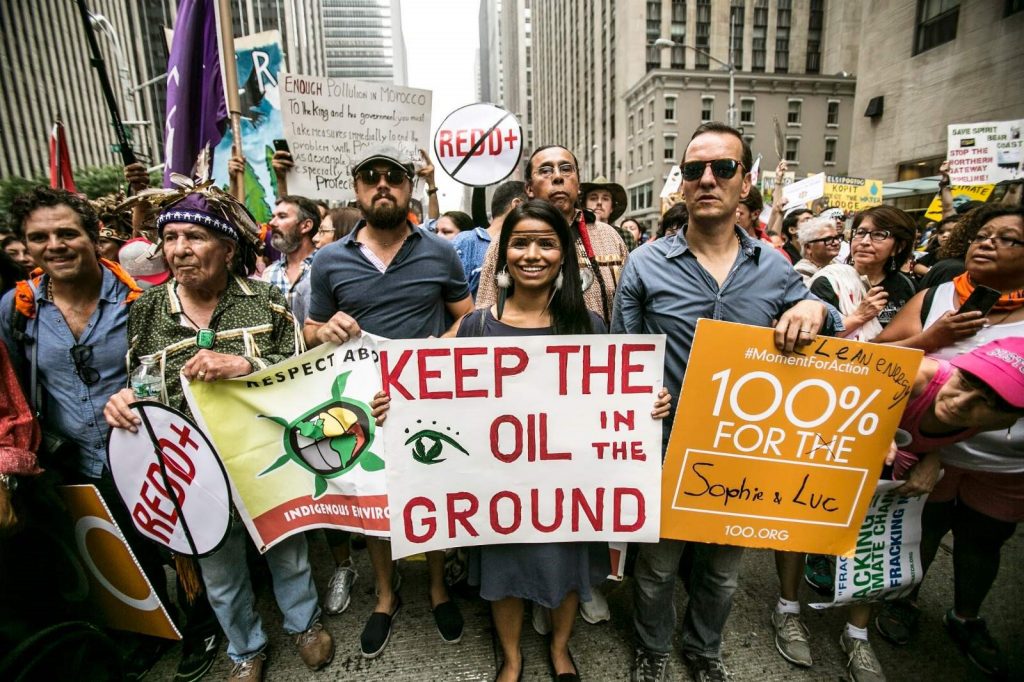
Try and think back to a time when you were 23 years old… What were your dreams? Your achievements? Where did your priorities lie? For Nina, at the tender age of 23, she has already won a lawsuit against her own government, canoed down the Seine in Paris in attendance of the COP21 with global leaders, lead a climate change march in New York with Leonardo DiCaprio and Mark Ruffalo by her side and most recently given birth to a newborn son. This is surely not a commonality for any 23-year-old, which is why it gives me great pleasure to introduce Nina Gualinga, from Sarayaku in the Ecuadorian Amazon, a woman I was lucky enough to attend school with in Stockholm, and one who continues to inspire me daily. – Klara Kvarnback
Nina can be described as a true ecofeminist with her priorities being the protection and preservation of the Earth and of all living things. Ecofeminism is a philosophy that combines movements which promote feminism and ecology. It is the practice of becoming harmonious with the ecology of the Earth using our true, ancient feminine knowledge. It sees the domination of nature and the exploitation of women as one in the same fight and encourages a return to a time of nurturing the planet and its women, the bringers of life. It seeks to eradicate all forms of social injustice, not exclusively female injustices, but sees the empowerment of the female as key. Through igniting activism and acknowledging the importance of the Amazon rainforest, Nina is fighting for a source that brings life for us all.
At six years old, Sarayaku, Nina’s village, was invaded by military forces to investigate oil exploitation. This was an obvious threat to the community at large and the women of Sarayaku took it upon themselves to fend off the military. They achieved this by different methods, one which worked well was taking the clothes and weapons from the soldiers whilst they were asleep. Eventually the soldiers retreated and a lawsuit against the Ecuadorian government was filed for an attack on indigenous people and their rights. The indigenous lawsuit against the government and big oil corporations was won in 2012. Such a win sounds uncommon these days but it is 100% real news.
After seeing the women come together and battle for their indigenous tribe, the realization and reminder that women hold immense power, was realized. As women, we are the bearers of life and are granted with maternal instincts, instincts of nurture, compassion and protection. These instincts are not exclusively for one’s child but extend outward to those in our communities, our tribes as well as our land. Within the Amazonian tribes, women hold a great deal of power and are seen as true equals to their warrior men, something we are still trying to achieve in western societies. Nina stands strong with her fellow women, and men, in their attempts to protect the land as well as their people.
Having an Ecuadorian mother and a Swedish father, adapting and learning from two totally diverse cultures has been a natural part of her upbringing. Since graduating from boarding school in Sweden, Nina has spent half her time in Sweden and the other half living rurally with her Amazonian tribe. Through attending school in Sweden and being educated by a top western school, Nina has been able to influence and inspire western society and appeal to them at their level. Her ability to navigate between two different worlds has afforded her the skills to inform first world countries of the importance of the protection of the rainforest and its peoples. Similar to Linzi, Nina is the voice for the voiceless, selflessly cleaning up the mess left behind by money hungry corporations and governments. The Ecuadorian government continuously tries to belittle the indigenous people, destroying their native land for profits and completely destroying their livelihoods and culture. Today the Sarayaku still do not have equal rights and Nina, and the tribes, continue to fight for preserving their way of life.
“Fast Fashion is like fast food, after the sugar rush it just leaves a bad taste in your mouth.” -Livia Firth
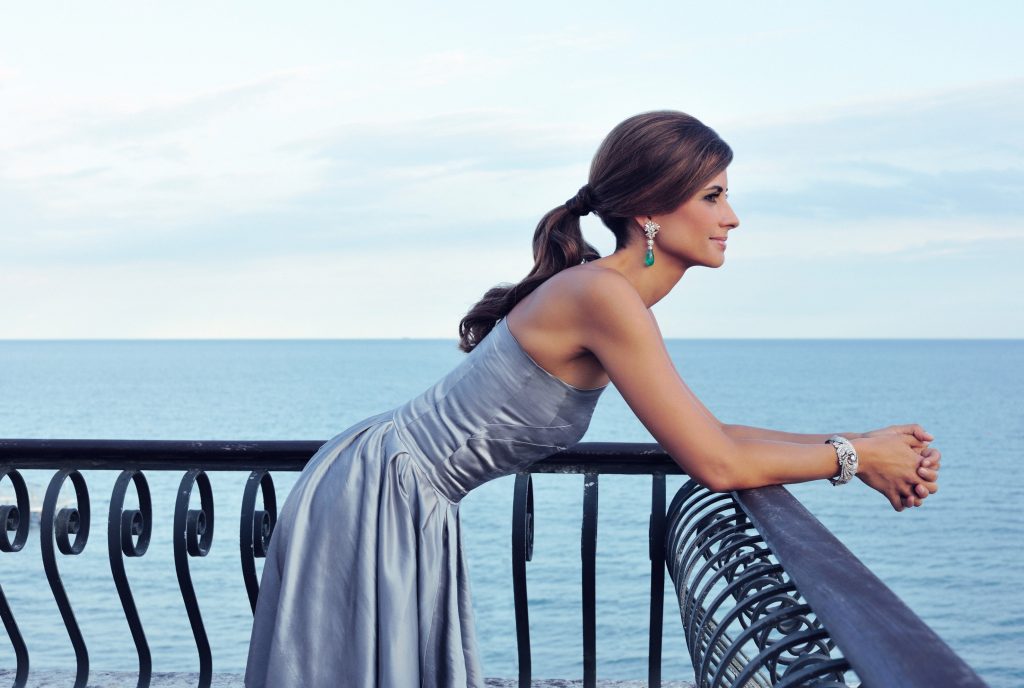
Another lady to add to the list of wow-woman is Livia Firth. You may recognize her surname from oh so charming british actor Colin Firth, but we are not here to speak about this man’s accomplishments within the film industry, but rather his wife’s ever strong battle with the fast fashion industry and journey to raise a fashionable world that is also sustainable.
Livia Firth, born Giuggioli in Rome, is the founder of Eco-Age, a member in Annie Lennox women’s platform – The Circle, and is an advocate for sustainable fashion. As fast fashion brands have taken on the market and retailers like H&M are pairing up with designers like Kenzo, Karl Lagerfelt, Balmain and Jimmy Choo, their apparel are hitting the market with a bang. Unlike the rest of the fashionistas jumping on this fast train, Livia opposes this fast fashion movement as she refuses to ignore the harmful impact it has on the environment as well as the workers driving it. The unjust, and extremely dangerous, working conditions which take place in the garment industries is appalling and we are seeing more and more women, in countries like Bangladesh, speaking out about this abuse.
Eco-Age, Livia’s fashion brand, started off as a consultancy agency in London. Livia, together with her brother, had an aim to help brands become more eco-friendly. By assessing the supply chain for a fashion company, and working closely with suppliers and brands, Eco-Age implements principles covering all aspects of sustainability on social, environmental and corporate goodness. When a company is certified by Eco-Age they take on the Green Carpet Challenge, which allows fashion pioneers to walk the red carpet knowing that their clothing is both stylish and sustainable.
She has helped reputable brands such as Stella McCartney, Gucci and many others on Net-a-Porter. If you were lucky enough to have made a purchase from Gucci’s 2013 handbag collection, then you too are supporting sustainable fashion, as this was the first ever luxury brand to have completed the high standards of sustainable production. Gucci served as proof that elegance and conscious fashion methods are a great mix.
Livia is certainly making the rounds with top brands and continues to inspire designers from around the world, making a positive impact on the fashion industry as well as our environment. Though the above mentioned information is highlighting only some of her success, she is using her name, brain and fame to try and change the perception of how we use clothes. She highlights that clothing is more than just a material or disposable object, it should be sacred and kept for many years. Let us return to a slow fashion movement where individual key pieces can be used to reflect our personality as well as the efforts put in to make it sustainable.
One of Livia’s triggers which inspired her to start working with a more kind-hearted fashion industry, was after hearing a quote from Ali Hewson (Bono’s wife) who said, “you carry the stories of the people that make your clothes.” This quote stuck with Livia and held immense truth. It is famous women like Livia, through using their awareness and platforms to expose the bigger picture, who become a force for good, inspiring us all to consider our own personal wardrobes and daily choices. Every living moment of our existence is a fork of choices. By having strong women leaders, such as the three mentioned above, we can reflect on our own decision making and view their journeys as a positive road paved for us to walk down, a road which acknowledges and honours the people whose voices do not sometimes get heard, but whom work hard so that we can enjoy luxury living.
When we think of women like Nina, Linzi and Livia and all they are doing to empower and protect their communities and Mother Earth, we are mixed with feelings of guilt and inspiration. Guilt over whether we too are playing our parts in trying to make this world a better place and inspiration for continuing to do what we can to bring hope for more peaceful days. Whilst some of the trials that these women face do not directly affect us, they indirectly are beginning to. In the Information Age we find ourselves in, prevailing issues are accessible and highlighted to us constantly through global media channels. We can no longer pretend to be blissfully unaware of what is going on in the rest of the world, in the countries which suffer for our materialistic benefits and lifestyles. With the bombardment of information, we have also become a hardened humanity, numb to our true feelings. It has become uncomfortable to be empathetic, we walk past homeless people without a second thought, watch news of innocent children being bombed, feel surprised when someone smiles at us on the sidewalk. We are in desperate need to feel once more. Our hope is that the rise of feminine qualities, such as compassion, empathy and nurturing, -in both men and women- will bring about a positive impact for humanity and our Mother Earth. If not for you, then for your children or the future generations. We leave you with an ancient Native American proverb, let us not forget.
“We do not inherit the earth from our ancestors. We borrow it from our children.”



